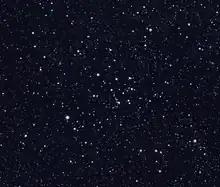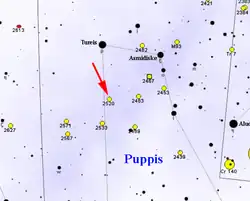NGC 2527
NGC 2527 (also catalogued as NGC 2520) is an open cluster in the constellation Puppis. It was discovered by William Herschel on December 9, 1784. The cluster was also observed by John Herschel on January 7, 1831. He also observed it on February 5, 1837, identifying it as a different object, which was catalogued as NGC 2520. It is a poor cluster and with no central concentration, with Trumpler class III1p.[5]
| NGC 2527 | |
|---|---|
 | |
| Observation data (J2000 epoch) | |
| Right ascension | 08h 04m 58s[1] |
| Declination | −28° 08′ 48″[1] |
| Distance | 1,960 ly (601 pc[2]) |
| Apparent magnitude (V) | 6.5 [1] |
| Apparent dimensions (V) | 20' |
| Physical characteristics | |
| Mass | 740[3] M☉ |
| Estimated age | 445 million years[2] 810 million years[4] |
| Other designations | NGC 2520, Cr 174 |
| Associations | |
| Constellation | Puppis |
The core radius of the cluster is 1 parsec (3.3 light years), while the tidal radius is 5.1 parsecs (17 light years) and represents the average outer limit of NGC 2527, beyond which a star is unlikely to remain gravitationally bound to the cluster core.[4] 37 stars, probable members of the cluster, are located within the central part of the cluster and 96 probable members are located within the angular radius of the cluster.[4] The brightest star members are A-type stars, with the brightest being an A3 star with magnitude 9.38.[6] In the cluster has been detected one white dwarf, with mass 0.77±0.03 M☉. Its age is estimated to be 441±188 years and the progenitor star has initial mass circa 3.1 M☉.[7] The turn-off mass of the cluster is at 2.8 M☉. The metallicity of the cluster is -0.01, similar to the solar one.[8]

NGC 2527 lies 3.8 degrees south of Rho Puppis and can be seen with 50mm binoculars as a moderately large, bright patch of haze, with no stars visible with direct vision.[9]
References
- "NGC 2527". SIMBAD. Centre de données astronomiques de Strasbourg. Retrieved 2015-06-19.
- WEBDA: NGC 2527
- Piskunov, A. E.; Schilbach, E.; Kharchenko, N. V.; Röser, S.; Scholz, R.-D. (6 November 2007). "Tidal radii and masses of open clusters". Astronomy & Astrophysics. 477 (1): 165–172. Bibcode:2008A&A...477..165P. doi:10.1051/0004-6361:20078525.
- Kharchenko, N. V.; Piskunov, A. E.; Schilbach, E.; Röser, S.; Scholz, R.-D. (3 October 2013). "Global survey of star clusters in the Milky Way". Astronomy & Astrophysics. 558: A53. arXiv:1308.5822. Bibcode:2013A&A...558A..53K. doi:10.1051/0004-6361/201322302. S2CID 118548517.
- Seligman, Courtney. "NGC 2520 (= NGC 2527 = OCL 685)". Celestial Atlas. Retrieved 19 November 2018.
- Lindoff, U (February 1973). "The open cluster NGC 2527". Astronomy and Astrophysics Supplement. 9: 299. Bibcode:1973A&AS....9..229L.
- Raddi, R.; Catalán, S.; Gänsicke, B. T.; Hermes, J. J.; Napiwotzki, R.; Koester, D.; Tremblay, P.-E.; Barentsen, G.; Farnhill, H. J.; Mohr-Smith, M.; Drew, J. E.; Groot, P. J.; Guzman-Ramirez, L.; Parker, Q. A.; Steeghs, D.; Zijlstra, A. (6 February 2016). "A search for white dwarfs in the Galactic plane: the field and the open cluster population". Monthly Notices of the Royal Astronomical Society. 457 (2): 1988–2004. arXiv:1601.02019. Bibcode:2016MNRAS.457.1988R. doi:10.1093/mnras/stw042. S2CID 587170.
- Reddy, A. B. S.; Giridhar, S.; Lambert, D. L. (11 April 2013). "Comprehensive abundance analysis of red giants in the open clusters NGC 2527, 2682, 2482, 2539, 2335, 2251 and 2266". Monthly Notices of the Royal Astronomical Society. 431 (4): 3338–3348. arXiv:1303.1104. Bibcode:2013MNRAS.431.3338R. doi:10.1093/mnras/stt412. S2CID 119191372.
- Thompson, Robert Bruce; Thompson, Barbara Fritchman (2007). Illustrated Guide to Astronomical Wonders: From Novice to Master Observer. Maker Media, Inc. p. 184. ISBN 9781680451917.
External links
- NGC 2527 on WikiSky: DSS2, SDSS, GALEX, IRAS, Hydrogen α, X-Ray, Astrophoto, Sky Map, Articles and images